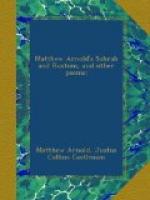=414. wrack.= Ruin, havoc. (Poetical.)
=418. glancing.= In the sense of darting aside.
=435. hollow.= Unnatural in tone.
=452. like that autumn-star.= Probably Sirius, the Dog Star, under whose ascendency, according to ancient beliefs, epidemic diseases prevailed.
=454. crest.= That is, helmet and plume.
=466. Remember all thy valour.= That is, summon up all your courage.
=469. girl’s wiles.= Explain the line.
=470. kindled.= Roused, angered.
=481. unnatural.= because of the kinship of the combatants.
=481-486. for a cloud=, etc. A distinctly Homeric imitation. Cf. the cloud that enveloped Paris—Book III., ll. 465-469, of the Iliad.
=489. And the sun sparkled=, etc. Why this reference to the clear Oxus stream at this moment of intense tragedy?
=495. helm.= Helmet; defensive armor for the head.
=497. shore.= Past tense of shear, to cut.
=499. bow’d his head:= because of the force of the blow.
=508. curdled.= Thickened as with fear.
=516. Rustum!= Why did this word so affect Sohrab? Note the author’s skill in working up to this climax in the narrative.
=527-539. Then with a bitter smile=, etc. Compare these words of the victor, Rustum, with the words of Sohrab, ll. 427-447, when the advantage was with him.
=536. glad.= Make happy.
“That which gladded
all the warrior train.”
—DRYDEN.
[162]
=538. Dearer to the red jackals=, etc.
Cf. I. Sam. xvii. 44: “Come to me,
and I will give thy flesh unto the fowls of the air,
and to the beasts of the field.” Careful
investigation will show the poem to abound with Biblical
as well as classical parallelisms.
=556-575. As when some hunter, etc.= One of the truly great similes in the English language.
=563. sole.= Alone, solitary. From the Latin solus.
=570. glass.= Reflect as in a mirror.
=596. bruited up.= Noised abroad.
=613. the style.= The name or title.
=625. that old king.= The king of Semenjan. See introductory note to poem.
=632. Of age and looks=, etc. That is, of such age as he (Sohrab) would be, if born of his (Rustum’s) union with Tahmineh.
=658-660. I tell thee, prick’d upon this arm=, etc. This is Arnold’s conception. In the original story Sohrab wore an onyx stone as an amulet. The onyx was supposed to incite the wearer to deeds of valor.
=664. corselet.= Protective armor for the body.
=673. cunning.= Skilful, deft.
=679. griffin.= In the natural history of the ancients, an imaginary animal, half lion and half eagle. Here the Simurgh. See note, l. 232.
=708-710. unconscious hand.= Note how the dying Sohrab
seeks to
console the grief-stricken Rustum.




